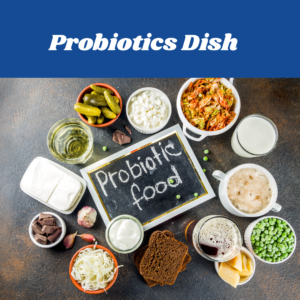Prebiotics and probiotics are supported by emerging scientific evidence for their role in digestive health. The best pre- and probiotic capsules are available on the market. People increasingly recognize the importance of the digestive system. The benefits of gut health are very prominent, as it plays a significant role in influencing the immune response of host cells. A strong immune system requires a balanced microbiota enriched with prebiotics and probiotics. There is growing awareness about the microbiota and how to improve its balance. Moreover, the gut and the immune system are not only aligned but also closely interconnected with conditions like anxiety and depression. More than 70% of serotonin is secreted in the gut.
Pre- and probiotics foods

Let’s talk about prebiotics.

Prebiotics serve as food for probiotics; they consist of indigestible material that our digestive system cannot break down but which becomes helpful in host cells and beneficial bacteria. These compounds promote the growth and proliferation of probiotic microorganisms and help maintain their survival. Dietary fibre is an essential source of nourishment for these bacteria. Many types of fibres—such as pectins, cellulose, and xylans—act as prebiotics. Additionally, common prebiotics like fructo-oligosaccharides, galacto-oligosaccharides, and inulin are widely used in supplement form, further encouraging the rapid growth of beneficial bacteria. Since these carbohydrates are indigestible, they are not absorbed by the intestine and are naturally difficult to digest.

Probiotics are live microorganisms that benefit gut health and the digestive process. They generally fall under the category of foods and supplements. However, if a product is promoted with claims to treat, mitigate, or reduce certain conditions, it may be classified as a drug by the Food and Drug Administration. A significant amount of research is ongoing regarding the importance of probiotics, and they have been shown to help treat a variety of diseases.
The term symbiotic are both prebiotics and probiotics combined. This concept is can be discussed as probiotics are benefited by the prebiotics as supportive and the beneficial for the growth of the organism. Individual benefits are vary and combined together when patients having for specific reason results are avail in both ways.
Synbiotics are either used as a drug or supplement, and they are primarily not categorically designed. This approach needs a lot of regulations in treatment strategies by the clinic.
The use of prebiotics in practical considerations is safe and valuable. These practical considerations are safe and effective for the gut flora, bile salts, etc. The selection of probiotics is based on safety and clinical effectiveness. The parameters for selecting probiotics are based on the genus and the species for proper identification. However, clinical evidence is work that has been done on the strains and has provided proof. And the strains created by the awareness of importance.
Pre- and probiotics are needed to improve quality of life and prevent many chronic diseases, such as cancer, digestive disorders, Obesity, and diabetes. Many clinical trials have identified the importance of their presence, leading to remarkable impacts on health.
Prebiotics are identified in many other food sources like onions, wheat, bananas, oats, legumes, rye, barley, soy, and cabbage. And also, like, let’s see, probiotics yogurt, kefir, Sauerkraut, Tempeh, Kimchi, and Miso.
Many food sources are available for prebiotics and probiotics, and traditional food preparations also have plenty of sources. However, one must consult a dietitian or nutritionist while selecting the supplement and preparing homemade prebiotics and probiotics.
Prebiotics and probiotics are often provided in supplementation as a capsule. The reason for the capsule form is a safe journey in the gut environment. It’s also easy to swallow for consumption. Caples can transport live microorganisms.
References:
